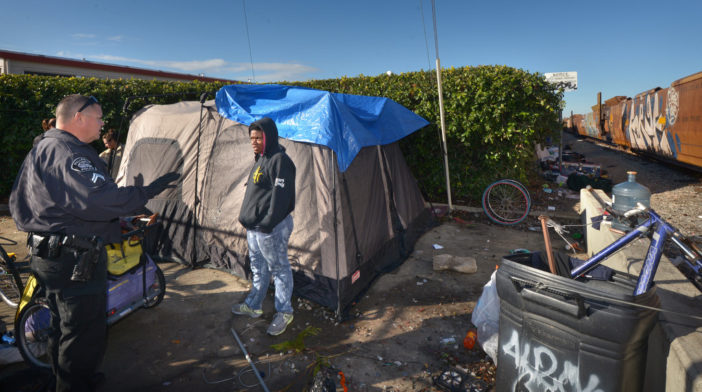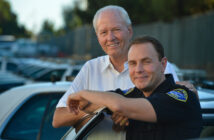Fullerton Police officers assigned to the Homeless Liaison Officer (HLO) Unit face the daily challenge of balancing compassion toward the community’s most destitute citizens with the responsibility of ensuring the city’s quality of life.
It’s a daunting task for the department’s four HLOs: Cpl. Ginny Johnson, Cpl. Dan Heying, Cpl. Jim Talbot and Officer Jonathan Munoz.
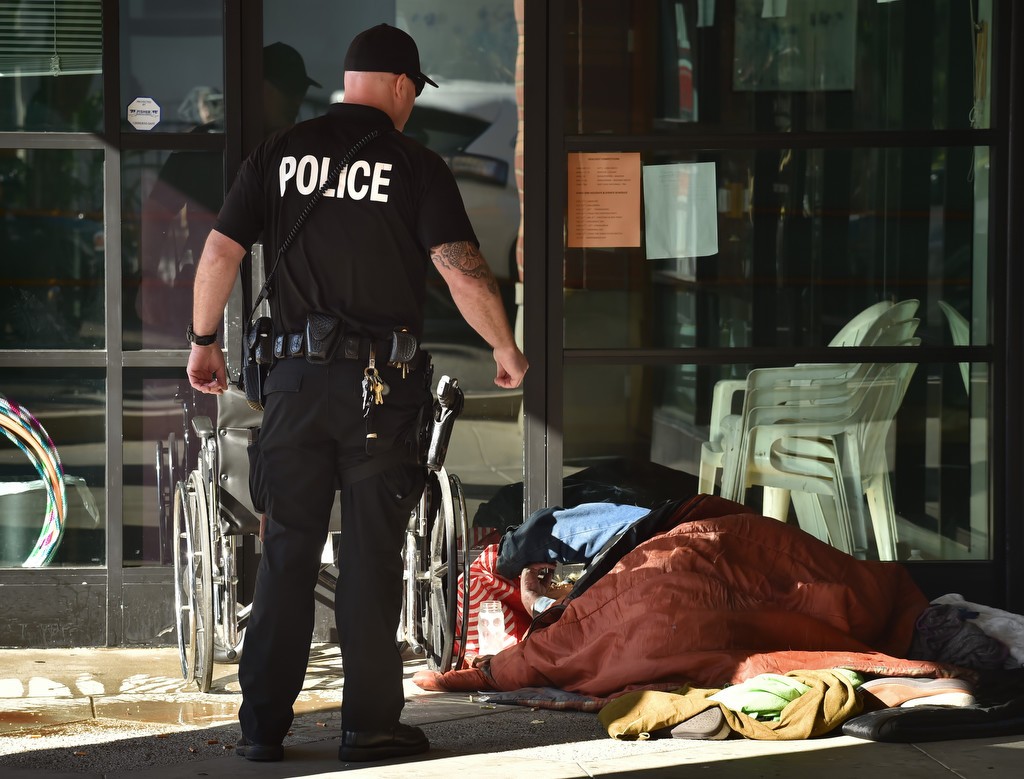
Cpl. Dan Heying, of the Fullerton PD Homeless Liaison Unit talks to a homeless man sleeping in front of the entrance to a business on Wilshire Avenue in Fullerton.
Photo by Steven Georges/Behind the Badge OC
Marie Avena, founder of the Coast to Coast Foundation, a local nonprofit that partners with the Fullerton PD in providing services to the homeless, estimates there are more than 300 homeless individuals in the city at any given time.
The Fullerton PD responded to 5,755 transient-related calls in 2016 alone, statistics show.
“I would say that unfortunately 90 percent of the homeless people we come in contact with are either addicted to drugs or have a mental illness,” Talbot said.
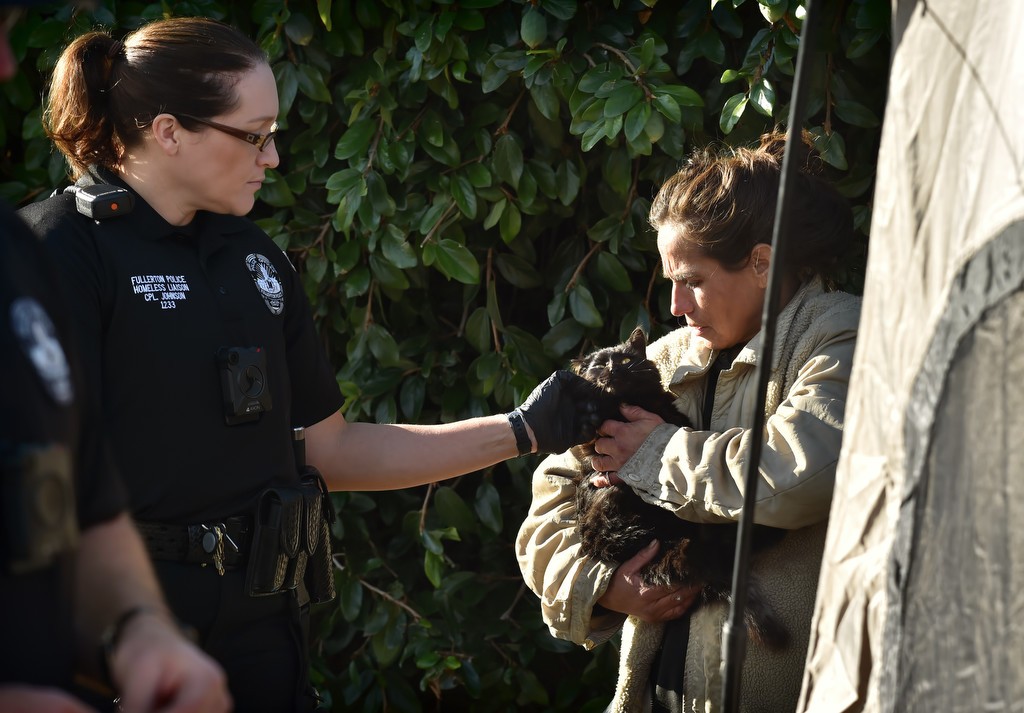
Cpl. Ginny Johnson of the FPD’s Homeless Liaison Unit talks to a homeless woman holding a cat she named Chelsea.
Photo by Steven Georges/Behind the Badge OC
During a three-hour period on a recent weekday, Fullerton HLOs encountered a woman with an apparent mental health issue illegally camping in a tent a few feet from railroad tracks.
The area was strewn with trash, and there was evidence of drug use and other transients camping there.
Officers had the option of issuing a citation but didn’t.
Instead, they offered services to the woman to get her off the street — including shelter and medical help — but the woman refused.
“I didn’t want to get her in trouble,” Talbot said. “I’d rather help her.”
Minutes later, officers encountered an intoxicated man sleeping on the cement, just outside the front of a business on Wilshire Avenue.
Another call involved a man with his pants almost down to his knees and barely able to walk.
Shortly after that call, the officers responded to a report of a disheveled woman trespassing on private property in a residential neighborhood.
The woman quickly became agitated and combative and had to be restrained. She was in possession of methamphetamine and a pipe.
While all the department’s officers receive specialized training (beyond that which is recommended by California POST, the body that governs law enforcement training and accreditation) in dealing with the homeless and mentally ill, the HLOs have quick access to resources such as temporary housing, substance abuse services, meal cards and clothing.
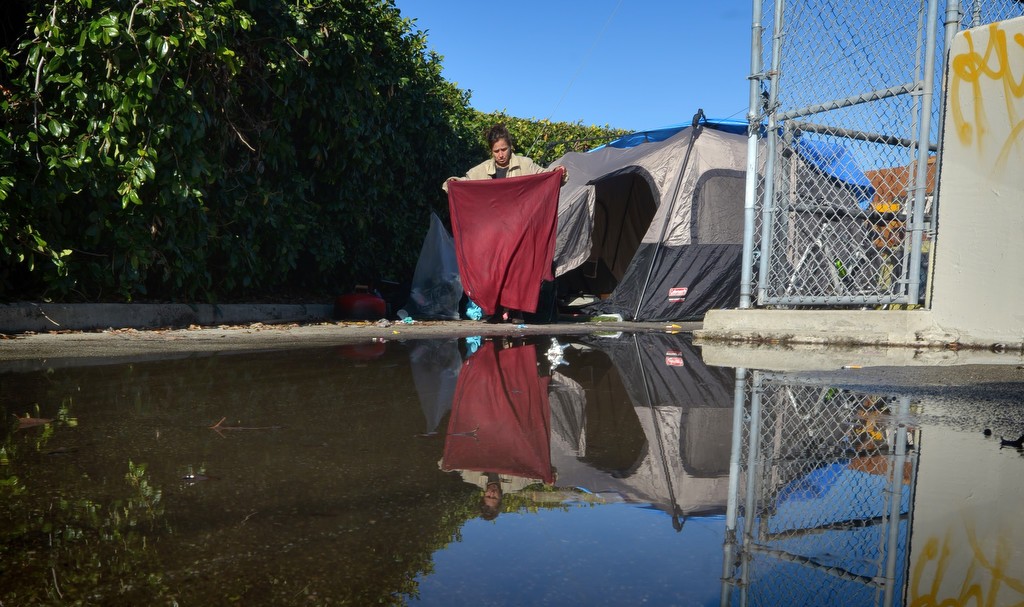
A puddle of water left over from the recent rains sits near a tent in Fullerton where a couple of homeless women currently stay.
Photo by Steven Georges/Behind the Badge OC
The Fullerton PD is one of a few Orange County law enforcement agencies to have a full-time Mental Health Clinician with them, in the field, on a full-time basis. Mental Health Clinician Hector Varela of the Orange County Health Care Agency partners with the HLO unit five days a week. This unique partnership allows FPD to provide immediate mental health services to those in need.
“My job is to provide resources to the homeless and do assessments,” Varela said. “I evaluate people suffering with mental illness and provide them with treatment if they need treatment or provide them with resources.”
Unless the situation rises to the level of a crisis, however, transients have the right to refuse help.
“Sometimes they are willing, but we can’t force them,” Varela said.
There are other challenges.
In many cases, shelters require potential clients to stay clean and sober and get cleared medically before they can move in.
“It’s stuff like that that is frustrating,” Johnson said.
But there are success stories.
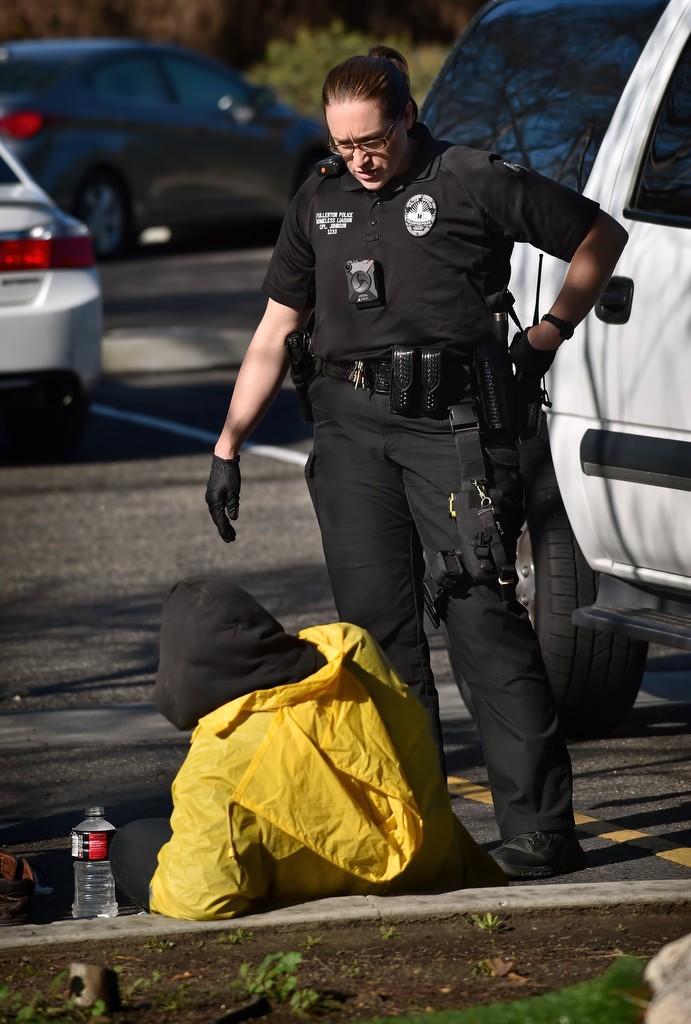
Cpl. Ginny Johnson of the FPD’s Homeless Liaison Unit talks to a homeless man camped out with his belongings in a business parking lot.
Photo by Steven Georges/Behind the Badge OC
Partnering with Coast to Coast, Fullerton HLOs facilitated the relocation of 15 homeless individuals in 2016, usually by reuniting them with family members.
Coast to Coast picked up the transportation costs.

Kendra, who lives in a tent near the railroad tracks, is trying to get back on her feet and find a job.
Photo by Steven Georges/Behind the Badge OC
HLOs and Coast to Coast also have partnered to place another 15 into temporary shelters, 23 into transitional housing and 14 into drug/alcohol treatment facilities.
Avena said the Fullerton PD HLO program exemplifies how a police department should take on its city’s homeless population.
“They are trendsetters,” Avena said.
The Fullerton PD is participating in a seminar titled Homelessness 101, 9 a.m. to noon, Feb. 18 at Wayfare Fullerton, 110 E. Wilshire Ave. Suite 101. Topics center around understanding homelessness and mental illness. Information: fullertonact.org
For other ways to get involved, go to coasttocoastfoundation.org
 Behind the Badge
Behind the Badge
